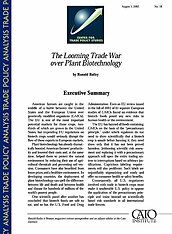Plant biotechnology has dramatically boosted American farmers’ productivity and lowered their costs and, at the same time, helped them to protect the natural environment by reducing their use of agricultural chemicals and preventing soil erosion. Consumers have also benefited from lower prices and a healthier environment. In developing countries, the deployment of plant biotechnology can spell the difference between life and death and between health and disease for hundreds of millions of the world’s poorest people.
One scientific panel after another has concluded that biotech foods are safe to eat, and so has the U.S. Food and Drug Administration. Even an EU review issued in the fall of 2001 of 81 separate European studies of GMOs found no evidence that biotech foods posed any new risk to health of the environment.
The EU has banned all food containing GMOs on the basis of the “precautionary principle,” under which regulators do not need to show scientifically that a biotech crop in unsafe before banning it; they need only show that it has not been proved harmless. Jettisoning scientific risk assessment and replacing it with a precautionary approach will open the entire trading system to interruptions based on arbitrary justifications. Capricious labeling requirements will also proliferate. Such labels are unjustifiably stigmatizing and costly and offer no consumer health or safety benefits.
Consequently, all U.S. negotiators involved with trade in biotech crops must make it unalterable U.S. policy to oppose the application of the precautionary principle and insist instead on scientifically based risk standards in all international trade forums.


